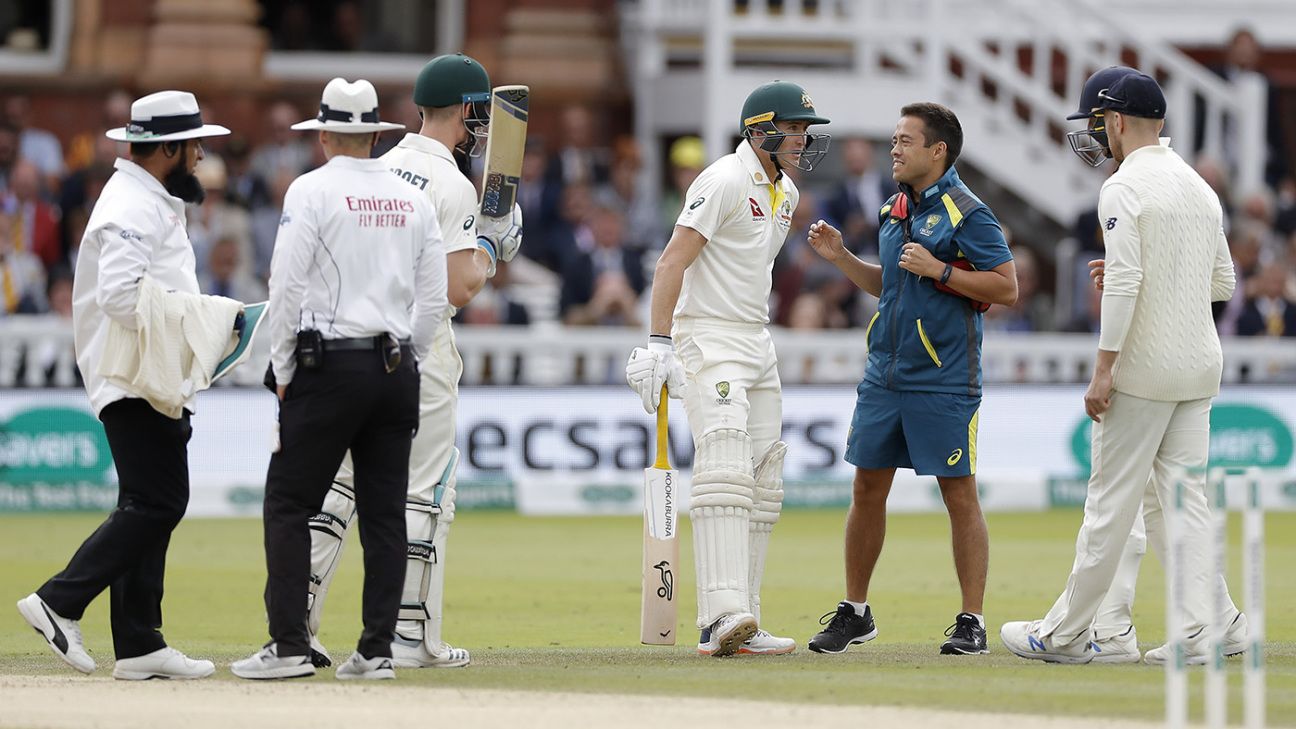
English authorities hoping to stage the first "bio-secure" Test matches since cricket shut down in the face of the coronavirus outbreak remain hopeful that the ICC will alter playing regulations to allow Covid-19 substitutions, according to Steve Elworthy, the ECB's director of special operations.
Earlier this month, the ICC's cricket committee recommended against allowing such substitutions, on the grounds that a player testing positive would require everyone involved in the match to go into quarantine. However, Elworthy was more optimistic that individuals displaying symptoms could be dealt with in a less disruptive manner, under the guidance of on-site medical teams prepared specifically for such eventualities.
The ECB has poured its efforts into contingency planning for England's home international schedule, and is still awaiting a green light for proposed dates and venues to host West Indies and Ireland in July/August, as well as Pakistan later in the summer. Plans to put on behind-closed-doors Test matches are well advanced, but the issue of how to mitigate and deal with the risk of infection during a game situation is one that has not yet been fully mapped out.
ALSO READ: Hales, Plunkett left out as England name 55-man training group
"That is one of the areas that the medical team, through [ECB chief medical officer] Nick Peirce, is working up," Elworthy said. "Clearly, part of this would be to isolate that individual as quickly as possible - we've got isolation rooms built into all of our venue planning. So as soon as anybody tests positive, they would be taken there. I know there are still some considerations from an ICC perspective about possible Covid-19 replacements, from a playing regulations point of view, so that still needs to be agreed. But ultimately it would be [down to] the medics on site.
"There are discussions ongoing about having a specific Covid-19 replacement protocol for Test cricket - one-day cricket, you test and you're clear in the morning, you play the game and you disappear. This is specifically for Test cricket, and we would hope that would be in place well before the Test series starts in July."
Under government guidelines covering the return to competition for elite athletes in the UK, England players will at some point move to stage two, which allows training in "small clusters" without the requirement of social distancing. Whether one player testing positive for Covid-19 would therefore necessarily compromise everyone else within that group would be down to the assessment of the medics, said Elworthy.
"Depending on the person and when they are tested and what they test for, what the test shows, that assessment will be made at that time; depending on who they have engaged with, where they are, how long they've been in the match, testing all of the players around them. Then that occupational health officer, or the medic on site, will then be able to make that assessment for us."
The ECB has been working on its proposals to create a "bio-secure environment" in which to play international cricket for many weeks now, in consultation with government. Elworthy gave details on a number of measures that would cover the 180-250 people likely to be allowed into the venue, including testing everyone on entry, regular thermal scanning, a cleansing and hygiene protocol, daily questionnaires and the use of PPE sourced privately, so as to avoid putting extra strain on the National Health Service.
The "two/three-venue model" is aimed at having two grounds for televised matches - understood to be Emirates Old Trafford and the Ageas Bowl - and another base to allow a third team to train - likely to be Edgbaston. Each of the venues will be configured to encourage social distancing, along with the use of different zones to separate groups such as players and match officials from those not staying on site.
"Everybody will be tested, everybody will be screened," Elworthy said. "But it's to try and make sure that we keep people as far away from each other as possible."
He described the ECB's discussions with other boards as "incredibly positive", ahead of official confirmation of the West Indies and Pakistan tours. Ireland are understood to be keen to fulfil their ODI fixtures, while talks have also been held with Cricket Australia, as well as the BCCI and CSA over potential women's series.
ALSO READ: Ireland 'itching' to play England ODIs despite risks - Stirling
Elworthy also suggested that the ECB was looking into allowing players and other personnel to move in and out of the bubble around match venues - referred to as the "bridge to the outside". With Joe Root, England's Test captain, expecting the birth of his second child in July, the ECB has a delicate issue to manage, and this remains another area in which there is still work to be done.
"All the different elements of where a person is going, which household they are moving into, and when they'll come back into the bubble - that protocol, of moving in and out through the bridge, is currently being worked up with the doctors," Elworthy said.
"Clearly the issue is, the more people you have in and out of the bubble, the weaker the bubble is. But at the same time, there are going to be circumstances where people are going to need to leave. So we will make sure that the protocols around leaving the bubble and coming back are in the shortest period of time, and the most safe and secure way possible."















 Phone: (800) 737. 6040
Phone: (800) 737. 6040 Fax: (800) 825 5558
Fax: (800) 825 5558 Website:
Website:  Email:
Email: 






